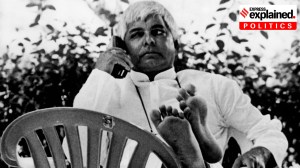In Blair’s shadow for 13 years, Brown has his day in the sun at last
He shows up for work in famously drab ties with his nails bitten to the quick. He hates networking, and didn’t marry until he was 49.

He shows up for work in famously drab ties with his nails bitten to the quick. He hates networking, and didn’t marry until he was 49. He’s the glowering figure often seen harrumphing on the bench behind his poised boss, Prime Minister Tony Blair, in the House of Commons. You might say he’s the “anti-Blair”, in more ways than one.
The Shakespearean conflict that has been the brooding back story to Britain’s leadership ended Wednesday when Gordon Brown, the brilliant and sombre treasury chancellor who has stood in Blair’s shadow for 13 years, became Britain’s 52nd prime minister.
As Blair submitted his resignation to Queen Elizabeth II and Brown made the journey from No. 11 Downing Street to No. 10, the two political leaders not only passed the torch of government, but concluded a dramatic saga of intense friendship and rancorous rivalry that has transformed the politics and economy of modern Britain.
“They were kind of like a couple who’ve been married for a long time. They got on each other’s nerves,” said a former Cabinet official. “They were highly interdependent. You look at their skill sets, they were completely different, and also completely complementary.”
The son of a Scottish Presbyterian minister who prizes prudence and duty in contrast to Blair’s uncanny zeitgeist vision and engaging style, Brown (56), partnered with Blair in fashioning the Labour Party’s decisive return to power in 1997—and would have led the left-of-centre party years ago, had he not deferred to the more dynamic and electable Blair.
Promised the premiership after Blair had his turn, Brown has waited in growing frustration and resentment in recent years as his longtime friend found first one reason, then another, why it was not the right time to go. The political marriage between the two has paralysed government when it was bad—and lately it often was—but also produced a remarkable chemistry that created the landmark reforms of New Labour and propelled Britain to an unmatched record of sustained economic growth.
Brown has run the treasury like a powerful fiefdom, giving himself final say on how much money ministers receive in their budgets and often leaving Blair himself in the dark about the national budget’s final tax and spending figures until the last moment. This was, say those close to them, a result of the famous power-sharing deal the two men cut at a London restaurant in 1994, when Brown agreed not to run for the Labour Party leadership.
Brown’s reluctance to delegate is legendary and stems from his characteristic impatience. “When you are prime minister, you can’t do everything,” a former treasury official said. “But he thinks he’s smarter than they are, and works harder than they do.”
Brown’s courage was tested at an early age, when he accelerated through school and entered Edinburgh University at 16. A rugby injury left him blind in one eye and locked in a darkened room for most of a year as doctors tried, with eventual success, to save the other eye.
Brown obtained a degree in history with first-class honours, and earned his Ph.D with the beginnings of a scholarly biography he eventually published on austere Scottish socialist James Maxton—meticulously researched while Blair was at Oxford fronting a rock band. After university, Brown went to work at Scottish television before being elected to Parliament, as Blair was, in 1983. Brown was quickly a rising star. And he found in Blair an enthusiastic intellectual partner in pulling the old, trade union-dominated Labour Party into a new era of market principles and globalisation.
In the early days, Blair often deferred to Brown. But that changed in 1994, when Blair apparently believed not only that he could beat Brown to the Labour leadership, but that he had the kind of appeal to election-crucial Middle England that the formidable Scot would never have. Brown eventually agreed that Blair was right.
As time went on, Brown seemed to smile less and glare more. He underwent a personal trauma when, after marrying public relations consultant Sarah Macaulay in 2000, their daughter Jennifer, born prematurely, died of a brain hemorrhage when she was 10 days old. The couple has since had two sons, one of whom has been diagnosed with cystic fibrosis.
Mr Brown
Gordon Brown’s rise to become prime minister marks the culmination of a 24-year political career, much of it spent in partnership with his friend — and rival — Tony Blair.
• He was born in Scotland on Feb 20, 1951. Beginning his education at the University of Edinburgh at the age of 16, his taste for politics soon became clear.
• After graduating, Brown was a lecturer on politics for four years, then became a current affairs commentator for Scottish television. In 1983, he entered Parliament as a member of Britain’s left-leaning Labour Party.
• With the conservatives in power, Brown worked his way up the opposition leadership ladder. By the time Labour chief John Smith died in 1994, Brown was one of two up-and-coming politicians tipped to succeed him; the other was Tony Blair. The two reportedly struck a deal: Blair would run for party leader and, if he became PM, would install Brown as treasury chief—the country’s No. 2 job. The deal also reportedly called for Blair to stand aside and let Brown take the top job during a second term—which did not happen.
• Brown is widely credited with helping steer Britain through a decade of economic growth, although critics argue that the foundation for Britain’s economic success were laid out under previous Conservative governments.



- 01
- 02
- 03
- 04
- 05




























